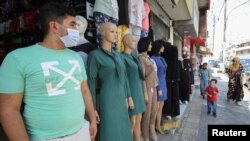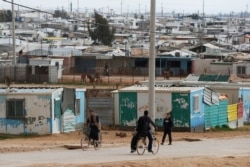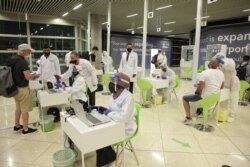Jordan’s prime minister resigned earlier this week in line with preparations for next month’s parliamentary elections. But observers say the government’s recent handling of the coronavirus pandemic and its economic fallout may have also led to Omar al-Razzaz’s resignation amid concerns about the country’s stability as infection rates rise and a weekend lockdown looms.
Jordan’s strict coronavirus lockdown and curfew measures ended in mid-June and only opened its main international airport on September 8. Then, the small Middle Eastern kingdom saw scant COVID-19 cases, most by truckers transporting goods across borders or citizens returning home.
But that positive picture has changed. Although the more than 1,500 daily case rate is far smaller than those reported in the U.S. or Europe, it is worrisome for a country with limited intensive care beds and resources. It also hosts about one-and-a-half-million refugees from regional conflicts and COVID-19 has now been detected in refugee camps.
The Jordanian government said this week the country’s economy shrank 3.6 percent in the second quarter due to the pandemic, making it the sharpest economic contraction in two decades. Economists predict unemployment will hit 35 percent by year’s end, its highest ever, according to the Jordan Economic Forum. Meanwhile, job losses and business closures are also impacting Jordan’s middle class.
This key U.S. ally lacks the oil wealth of its Gulf neighbors and is highly dependent on foreign aid. Jordanian analyst Labib Kamhawi tolf VOA that reduced tax revenue and foreign remittances have also taken their toll.
“The state is dependent almost 80 percent on its income from taxation. By virtue of the lockdown, the economy came to a halt and a lot of people suffered. The government had to issue decrees that allowed people not to pay taxes or postpone payment. A lot of the income from expats has evaporated. Foreign aid is also diminishing which means on the whole Jordan will not be able to make ends meet,” said Kamhawi.
The U.N. development program told Reuters news agency that Jordan was already hit by years of sluggish growth and high unemployment, and now “many families have little savings left to cope with income losses due to lockdown measures.”
Kamhawi said the country is fragile.
“Jordan should be worried that peace and stability of the country might simply disappear under the pressure of need and economic failure, but because people are also afraid that what hit Syria, Libya, or Yemen might hit Jordan, if people take matters into their own hands,” said the analyst.
Yet financial services company Standards and Poor's is maintaining the kingdom's stable B+/B ratings. It estimated a 75-percent drop in tourist receipts this year for the sector that provides16-percent of Jordan’s Gross Domestic Product.
Jordan has received more than $1.7 billion in grants and loans from Western donors so far, economists say, helping to ease a budget deficit expected to double this year to over 5 percent of GDP.






